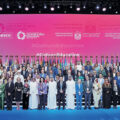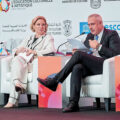- © unesco / Abu Dhabi, UAE
- О.Б.Любимова, Э.Оттоне / Olga Lyubimova, Ernesto Ottone
In February 2024, Abu Dhabi, the capital of the UAE, hosted the World Conference on Culture and Arts Education. The conference was co-organized by UNESCO and the Government of the United Arab Emirates.
This important intergovernmental forum brought together representatives of UNESCO member states, as well as its associate members and observers. The participants included representatives of non-governmental and other international organizations.
The Russian delegation, which consisted of representatives of relevant departments, was led by Olga Lyubimova, Minister of Culture.
The participants of the conference from 125 countries, including 90 ministers and deputy ministers, discussed the problems and prospects of promoting arts education in light of today’s challenges, such as the rapid development of information and communication technologies and artificial intelligence. The organizers paid attention to mechanisms for integrating the cultural component into national educational systems and enhancing international cooperation in this field.
The Russian Federation is a multinational country that consists of more than 190 ethnicities and nationalities. We prioritize culture and arts education and promote the development of student creativity. Russia provides free education at all levels.
Denis Gribov
Creating opportunities for self-fulfillment impacts the quality of people’s lives and is one of the key elements of transforming Russia’s economy. To support talented individuals, we have created an educational environment that allows them to develop their creative potential throughout their lives.
Olga Lyubimova
Olga Lyubimova spoke at the session “Equal Access to Culture and Arts Education”. She talked about the traditions of the national art school, outlined plans for promoting higher arts education in today’s world, and shared best practices in spotting young talents and creating an accessible learning environment for people with disabilities. As part of the discussion “Skills for Shaping a Sustainable and Just Future”, Denis Gribov, Deputy Minister of Education of the Russian Federation, spoke about the progress in secondary and general culture and arts education.
On the sidelines of the forum, Dina Kirnarskaya, Vice-Rector for Public Relations of the Gnesin Russian Academy of Music, delivered a lecture on the topic “Why do we need general music and arts education?” Kirnarskaya explained how various art attribution tasks can be used to develop intellectual abilities and creative potential, and how art-related assignments can help improve modern teaching methods.
The main outcome of the conference was the adoption of a new international document — a Framework for Culture and Arts Education.
Sources: mid.ru, edu.gov.ru, culture.gov.ru


